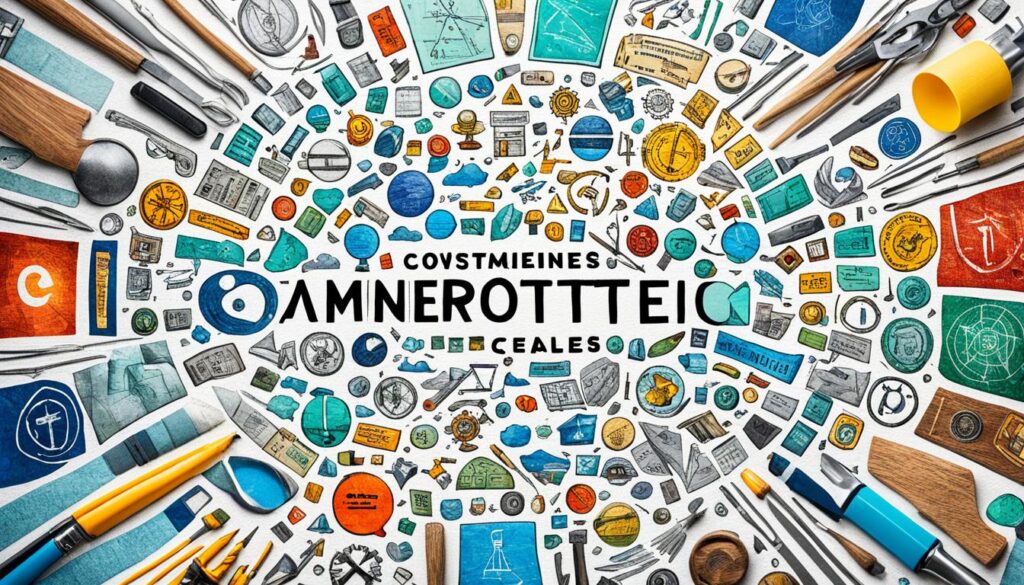Choosing the right education degree program for your career goals is important. It might seem overwhelming with so many choices. Begin by defining your career goals. Are you interested in teaching, leading in education, or specific areas like counseling or designing programs? Look for programs that fit your interests and goals. The program you pick will shape your educational path.
Check out the program’s reputation, curriculum, and how flexible it is. Also, see if you can get financial help. This will make your decision easier. It will help you choose the best education degree program for your career growth.
Key Takeaways
- Identify your career goals and align them with the right education degree program.
- Research degree programs that match your interests and long-term educational goals.
- Evaluate program reputation, curriculum, and flexibility to make an informed decision.
- Explore financial aid opportunities to ensure the program is financially feasible.
- Selecting the right education degree program is crucial for your personal development and professional growth.
Identify Your Career Goals
Before starting your education journey, think about what you want to achieve. Consider what you love and are passionate about. This will help you decide what age group or topic you want to teach.
There are many paths to choose from, like traditional teaching or leading in education. Think about your long-term goals. They will help you pick the right degree. Your degree should give you the knowledge and skills you need for your chosen career.
Assess Your Interests and Passions
Begin by thinking about what subjects or age groups you find most interesting. You might love teaching young kids or prefer the excitement of a high school class.
Knowing your personal and professional goals will guide you. It’ll help you pick a specialization that matches your talents and interests.
Explore Potential Career Paths
Education has many career paths, not just teaching. You can consider roles in educational management. This could mean being a principal or helping design school programs.
There are also roles in corporate training. Here, your teaching skills can help develop employees in different fields.
Consider Long-Term Aspirations
Think about where you want your teaching career to go. Do you want to lead a school or work on educational policy? Maybe you dream of starting your own teaching program.
It’s key to think about your long-term goals now. This will help you choose a degree program that supports your professional dreams. The right program will give you the skills and knowledge for your future career.
Understand the Education Landscape

The education world has many degrees for those who dream of teaching. There are bachelor’s, master’s, and even doctoral programs. You can focus on areas like early childhood or special education. Knowing about these types of education degrees is key before you start your journey.
Today, you can learn either on campus or online. Both ways have their benefits. Deciding what’s right for you is important. Think about how you like to learn and what your future job needs. This will guide you to the best degree program for your goals.
Types of Education Degrees
In education, you can choose from many degrees. It goes from bachelor’s to master’s and doctorates. Whether you’re into early childhood or special education, there’s something for everyone. These degree programs will teach you what you need for a great career in education.
Traditional vs. Online Programs
Deciding on an education degree program means looking at the big picture. Traditional classes let you learn face-to-face and try things out. On the other hand, online learning gives you the freedom to study when it suits you. Knowing what you prefer can help you pick the degree program that fits your style and life. This choice shapes how you learn and prepare for your career.
Research Accredited Programs

Choosing an education degree program requires you to prioritize accreditation. Accredited options meet high quality standards set by respected bodies. This ensures you get a thorough education, ready for your teaching career.
Research which programs are accredited. This way, you can trust your academic achievements will be valued.
Importance of Accreditation
Accreditation is like a mark of excellence. It shows a program has been checked and offers top-notch curriculum and support.
Going for an accredited course means your education meets recognized levels. And guarantees you’ll learn what’s needed for a successful teaching career.
Accrediting Bodies in Education
In the U.S., key accreditation comes from NCATE and CAEP. These groups review programs on their teaching methods, outcomes, and instructors. They make sure what you learn meets high standards.
Choosing a program they’ve accredited means you’re choosing quality. And you can trust in the value of your degree.
Evaluate Program Reputation

When you look for an education degree program, think about the school’s reputation. A program’s standing in the education sector is key. It helps you find out if it has good classes, hands-on teaching chances, and ways to grow professionally.
Rankings and Reviews
Checking a program’s rankings and reviews can tell you a lot. Find programs with top spots in lists like those from U.S. News & World Report. Also, see what students past and present say online about their experiences. It gives you a sneak peek at what to expect, from teaching quality to the school’s atmosphere.
Alumni Success Stories
Looking into what a program’s alumni have achieved can say a lot. Learn about the jobs and accomplishments of former students. See if they’ve taken on important roles in education or won any awards. Their stories show how well the program sets you up for success in this career.
Examine the Curriculum

The curriculum of an education degree is key in shaping what you know and do. It’s wise to search for programs with a balanced mix of classes. These should cover education basics, how to teach, and how kids learn. By checking out the kinds of core courses and specializations a program offers, you can pick the one best for you. This could be something like teaching young kids, older kids, or certain subjects.
Practical experience and internships put what you learn into action. They help you manage a class and get real life teaching know-how. Make sure your chosen program gives enough focus to these. This step will make you ready for the real challenges of teaching.
Don’t forget about technology integration in the program. The use of technology in teaching is only going to become more important. You should find a program that teaches you how to use digital tools well. This will set you up for a tech-savvy teaching world ahead.
Consider Program Flexibility

When choosing your education degree, think hard about the flexibility it gives you. Look for options that fit your situation and how you like to learn. This choice can make a big difference in your studies and reaching your goals.
Online and Hybrid Options
Online and hybrid programs have gotten more popular. They let students learn when it fits their schedule. This is great for those with jobs or busy lives.
Through online and hybrid learning, you can make your education work for you. This boosts your chances of doing well.
Part-Time and Accelerated Programs
Part-time and fast-track programs are common in education degrees. Part-time studies make it possible to learn while working or taking care of your family. They adjust to your life thanks to fewer classes and flexible schedules.
On the other hand, accelerated programs speed up your studies. They might offer quick courses or sessions in the summer. This shortens the time to get into college or the university you want. It’s worth looking at these choices to pick the best program for your goals.
Explore Financial Aid Opportunities

Getting an education degree means you’re investing in your future. It’s crucial to understand the costs involved. This includes tuition, fees, and what you need to live. Make sure it fits your budget. Look into scholarship and grant opportunities for people wanting to teach. They can make paying for school easier.
Scholarships and Grants
There are many scholarships and grants for those studying education and certifications. They can lower how much you pay for school. It’s key to look into these options. This way, you can find more ways to help pay for your education and afford your degree program.
Employer-Sponsored Education Benefits
While looking for scholarships and grants, check if your job helps with school costs. Some employers have tuition reimbursement programs. This means they might help you pay for part of your schooling. Companies want to support their workers’ growth. They might help you pay for degrees or certifications. Knowing all your options can make your education more affordable.
Education Degree

Education degree programs let you specialize based on your career goals. Love working with young kids? Want to guide elementary or secondary students? There’s a program for you.
Early Childhood Education
We have programs in early childhood education for teaching young learners. From preschool to third grade, you’ll learn to create fun and tailored learning spaces. Here, students’ social, emotional, and cognitive development is key.
Elementary Education
Elementary education programs ready you for grades K-6. You’ll get a strong foundation in important subjects, teaching strategies, and class management. You’ll help shape young minds by knowing and meeting their learning needs.
Secondary Education
More into teaching older students? Secondary education programs are for you. They dive deep into subject knowledge and teaching methods. You can inspire students in math, science, English, history, and more.
Special Education
Looking to support students of all learning abilities? Special education is a great path. You’ll learn how to design curricula and use special teaching methods. This ensures every student can learn and grow in a welcoming space.
Choosing the right specialization is key to a fulfilling teaching career. It allows you to deeply influence your students and the education field.
Career Prospects and Job Outlook

An education degree opens many doors beyond just teaching in classrooms. Teaching careers exist in public schools, private schools, and more. You get to guide students and help them grow.
Teaching Careers
With an education degree, you can teach various grades and subjects. You might focus on math, science, English, or social studies. There are also paths in early childhood education, special education, or teaching English as a Second Language.
Teaching can be very rewarding. You inspire the next generation.
Educational Administration
A degree in education can lead to educational administration roles. You might become a principal, a supervisor, or a curriculum designer. Your decisions can shape the direction of schools and impact student learning.
Corporate Training and Development
If you’re interested in a non-traditional path, consider corporate training and development. Here, your teaching skills help in training employees in tech, healthcare, or business. This is a way to use your teaching background in a different setting.
Looking at different career prospects helps you choose the right education program. Think about your future in teaching, leadership, or in training employees.
Seek Guidance from Advisors

Finding the right education degree program can be tough. Seeking help from skilled advisors can make a big difference. Advisors within the education field can share insights about the courses and the skills you’ll gain. Career counselors can help match your academic goals with your career dreams, both inside and outside the university.
Academic Advisors
Academic advisors are key in helping you pick the best program for your dreams. They know a lot about what each program offers. They’ll help you choose what fits best with your goals, making sure you gain the right skills for teaching or leading in education.
Career Counselors
Career counselors offer another layer of guidance. They help you understand your education’s link to your future job. With their help, you can explore job opportunities in teaching, school leadership, or even training in companies. They help steer you towards goals that make your career in education satisfying and successful.
Also Read: The Top 10 Universities Worldwide Offering Scholarship
Conclusion
Finding the right education degree is key to your teaching career. Start by setting your career goals. Know the education world. Look for programs that are well-recognized. Check their reputation and what they teach.
It’s also wise to think about how flexible a program is. Look into financial help and talk to advisors. They can help you pick the best path. This process helps you make a choice that’s perfect for you.
The best education program will give you the skills you need. You can aim for teaching, leading, or other education jobs. With the right degree, you’re set to hit your career goals. And, you’ll help improve education.
Take your time to explore your options. Choose a program that fits your needs and helps you grow. This is a chance to shape education’s future. And, to make a difference in students’ lives and communities.
FAQs
What are the key factors to consider when choosing an education degree program?
When picking an education degree, think about your goals. Understand the field and find reputable programs. Look into the program’s flexibility and financial support options. Also, getting advice from academic advisors is wise.
How do I determine my career goals in the field of education?
To know your career goals, look into what you love. Find out more about teaching or educational leadership. Think about where you want to be in the future. This approach will guide you to the right education program.
What are the different types of education degrees available, and how do they differ?
There are several education degrees like bachelor’s, masters, and PhDs. You can specialize in early childhood, elementary, secondary, or special education. Choose between on-campus and online classes based on what suits you.
Why is accreditation important when selecting an education degree program?
Accreditation is important as it ensures a program meets quality standards. Graduates from accredited programs are more likely to get teaching licenses. Always pick a program that’s accredited by well-known groups like NCATE or CAEP.
How can I evaluate the reputation of an education degree program?
To check a program’s reputation, look at its rankings and reviews. High-quality programs often have praise in the educational community. Hearing success stories from alumni can also give you an idea of what to expect.
What should I look for in the curriculum of an education degree program?
When looking at the curriculum, make sure it covers key education principles. It should include courses on teaching methods and child development. Choose a program that lets you focus on areas that interest you.
Also, look for opportunities to gain real teaching experience. Programs with internships or practicums and those that use the latest tech in teaching are great choices.
What flexible program options are available for education degree programs?
Education degrees come in various flexible forms. You can study online, part-time, or through a hybrid of online and in-person courses. This makes it easier to fit your studies around work and life.
How can I find financial aid opportunities for an education degree program?
Look for scholarships and grants aimed at future educators. Your employer might also help with tuition costs. Make sure to explore all financial aid options to find the best fit for you.
What are the different specialization options in education degree programs?
There are many specializations in education degrees, from early childhood to Special Ed. Choosing the right one can improve your teaching career prospects.
What career opportunities are available with an education degree?
With an education degree, you can teach in schools or work in other educational roles. This includes being a principal, developing curriculum, or training in companies.
How can academic advisors and career counselors assist in the education degree selection process?
Academic advisors and counselors can be a huge help. They offer insights into programs and their requirements. They can also ensure your education lines up with your career goals.
Source Links
- https://online.uc.edu/blog/how-to-know-if-your-degree-choice-aligns-with-your-desired-career-path/
- https://www.teacher.org/blog/tips-choose-teaching-degree-program/
- https://www.cornerstone.edu/blog-post/five-reasons-why-education-helps-to-advance-your-career-at-any-level/




